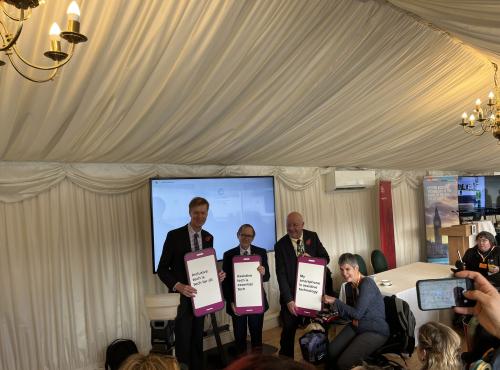Build Back Better - If not now, when?
With the first Covid wave behind us, more attention is being paid to the type of society we want to rebuild. Many have rallied around the demand to ‘Build Back Better’ – in part as a response to the need for rapid climate action.
A fact not repeated enough is that emission reductions from the Covid shutdown (about 7-8% globally) need repeating annually, for a decade, to have a chance of keeping warming below 1.5oC. This, whilst reopening the economy and ensuring jobs and livelihoods are protected. It is hard to avoid the conclusion that this is impossible. But for every 0.1oC over the 1.5oC target, things will get worse – potentially exponentially as tipping points in the climate system are reached. The case for immediate action on emissions has never been clearer and the Covid shutdown has revealed the immense scale of this task.
This blog discusses Government action to date on climate priorities, and what we might expect from the coming months. It’s important to recognise the focus thus far has been on initial crisis response, followed by measures to protect jobs. Phase three, ‘building back better’, is planned for the Autumn Budget and the Comprehensive Spending Review (CSR).
So far the response seems to show the Government understands what the climate priorities are, but needs to do more to demonstrate a fully-formed plan to tackle the scale of ambition required. Take domestic heating. This accounts for 13% of total emissions in the UK, and a large chunk of the solution is already known.[i] Investment in home energy efficiency retrofits is ‘shovel ready’, will provide much needed jobs, and will be felt across the whole country.[ii],[iii] The Government seems to understand this. As part of his ‘Plan for Jobs’, the Chancellor announced a Green Homes Grant, including £2 billion to support energy efficiency improvements for home owners. Yet according to the Committee on Climate Change, even the £9 billion pledged for home energy efficiency in the Conservative manifesto falls short of the investment needed.[iv]
Moving onto transport, it’s important to note that petrol and diesel cars account for a similar amount of emissions to domestic heating, and are also a major contributor to air pollution. The lockdown measures have cast doubt on previously held assumptions about how we get around. The likelihood of every home worker returning full time to an office seems remote, and the need for distancing has encouraged more people to move to greener transportation methods, such as on foot or by bike. This type of behavioural rupture presents a once-in-a-generation opportunity to restructure how we travel. However the £5 billion announced for buses and cycling lacks clarity on how it will be spend, and is dwarfed by a £27 billion capital spend committed to road building.
While there is no perfect response to an economic recovery following a pandemic, the current level of planned investment in the UK has room for improvement. The ‘Plan for Jobs’ amounts to approximately £30 billion of spending[v], though the small amount of capital spend is mainly accounted for by planned investment being brought forward.
However there is cause for hope in the Autumn Budget. The ongoing Net-Zero Review and upcoming National Infrastructure Strategy will provide the Chancellor with a useful fiscal blueprint. In acknowledgement of historically low interest levels, the Chancellor has also commissioned a review into Government spending rules - potentially increasing the fiscal space for a net-zero transition. He has also ordered a review of the Green Book, which in its current form acts as a break on investment in areas that need it most. By the autumn, the Chancellor will have everything he needs to deliver a truly transformative green investment package.
A harsh reading of the governments climate policy thus far is that it is simply too timid. A more generous reading is that the Chancellor is biding his time. Currently, a second Covid wave looks likely and is already taking hold in some of the UK’s trading partners. Yet the climate crisis waits for no-one2050 might seem distant compared to the immediacy of a second Covid wave, but meeting our climate obligations means drastic cuts right now. Neither Covid nor Brexit change this timeline.
With a Government willing to talk the talk on climate change, a once-in-a-generation need for huge investment, COP26 on the horizon and 10 years left to re-orientate our economy, a clear question emerges for the Autumn Budget - if not now, then when?
[i] https://www.policyconnect.org.uk/sites/site_pc/files/report/1251/fieldreportdownload/uncomfortablehometruthsfuturegasseriespart3.pdf
[ii] https://neweconomics.org/2020/07/a-national-house-retrofitting-programme
[iii] https://www.smithschool.ox.ac.uk/publications/wpapers/workingpaper20-02.pdf
[iv] https://www.theccc.org.uk/publication/reducing-uk-emissions-2020-progress-report-to-parliament/
[v] https://www.instituteforgovernment.org.uk/explainers/governments-post-covid-19-stimulus-package



